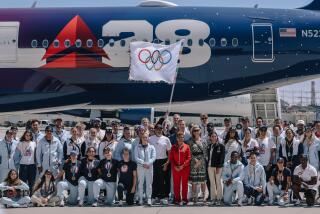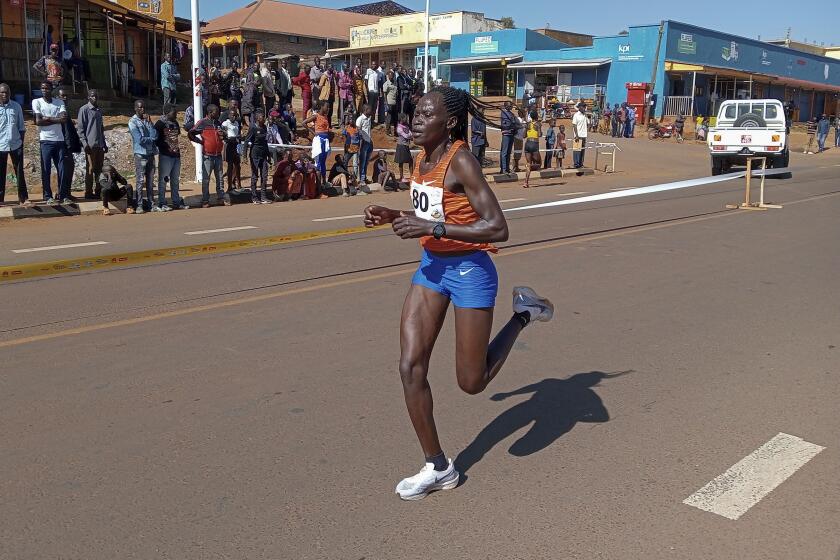TELEVISION : Atlanta Committee Takes Unique Look at Olympic Coverage
The organizing committee for the 1996 Summer Olympics in Atlanta has had discussions with at least five groups or individuals involved in television production about the possibility of providing the world feed of the Games, an unprecedented step for an Olympic competition held in the United States.
In years past, the American television network that won the rights to Games in the United States also served as the originator of the television signal for the world feed. ABC served in that capacity for the 1984 Summer Games in Los Angeles and the 1980 Winter Games in Lake Placid, N.Y. The world feed provides many hours of programming from each venue. The rights holder in each country has their choice from that coverage and then can supplement with its own coverage.
From the 1988 Games in Seoul, the U.S. viewer had about 10 hours a day of coverage for the 16-day event as opposed to the world feed, which provides more than 2,000 hours for the 16 days.
“We want to try to the fullest extent possible to make sure we have financial control,” said Billy Payne, chief executive officer for the Atlanta organizing committee. “We don’t want to just sub-contract this thing out and say to someone ‘Just go do it.’ I have not heard directly from the networks on this, but generally we understand from (people in the television business) that if we can convince the networks that we can produce and assemble the expertise necessary to do it, that would be acceptable to them.”
But a highly-placed network executive said: “I think any network would not want to see that decision made before the American rights are up for bid. I’d be very surprised if they made an agreement on this before that time.”
However, Payne said Wednesday from Atlanta that he hopes to settle on a company to provide the world feed by mid-September. The rights bidding on the 1996 Games is not expected to take place until next fall, after the Barcelona Olympics, which run from July 25 to Aug. 9. NBC paid $401 million for the U.S. rights.
In basketball, for example, NBC would have its broadcasters and cameras covering the games it chooses. For those games, it also would have available images from the world feed to supplement its coverage.
In fact, there may be no difference in coverage for most U.S. viewers, but this would be yet another indication that the networks’ sway over sports is slipping.
At least five groups or individuals have made presentations to the Atlanta committee, with the possibility of one more group still to be heard from. The five include Turner Broadcasting, located in Atlanta; Ohlmeyer Communications in Los Angeles; TV Games ‘96, a consortium of three companies located in Connecticut, Minnesota and Los Angeles, which includes Michael Weisman, former executive producer of NBC Sports; Ralph Mellanby and Associates from Toronto and Calgary; and Manolo Romero, a European Broadcasting Union executive who is overseeing production of the world feed for the ’92 Games in Barcelona.
Weisman, who produced the 1988 Games for NBC and now works for Davis Sports Entertainment in Los Angeles, said none of the networks want any part of producing the world feed, no matter who wins the rights.
“The networks will save the dough, the headaches, worrying about all the equipment, it makes a lot of sense,” he said. “Why would a network even want to bid on doing that now? They want to see how Barcelona does, how Albertville does. None of the networks emotionally or financially are willing to make the commitment now for something that’s five years away. Meanwhile, Atlanta has to get started building, budgeting. This is one thing they can get done now.”
Atlanta organizers are also very much concerned that the networks’ current economic problems may carry over to the bidding for the rights fees.
Each of the five presentations included roughly the same basic elements, and they all estimated the costs of producing the world feed ran between $100 million to $125 million according to sources in the organizing committee and several of the groups. That would include money to build a broadcast center for use by broadcasters around the world, as well as supplying equipment and manpower-producers, directors, technicians, even broadcasters for some sports.
“We believe the U.S. networks are just not willing to do this because of the money involved,” said Tony Andrea of TV Games ‘96, one of the principals in putting together the consortium. “ABC did it all in L.A., but times have changed. Today, with viewers having more choice on what to watch, the networks are getting a lower share of the audience, which means less ad revenue, which means less profit. They’re cutting back and a lot of that is happening in their sports divisions. I don’t think they’re willing to put the money up front to do it. Weare.”
More to Read
Go beyond the scoreboard
Get the latest on L.A.'s teams in the daily Sports Report newsletter.
You may occasionally receive promotional content from the Los Angeles Times.







